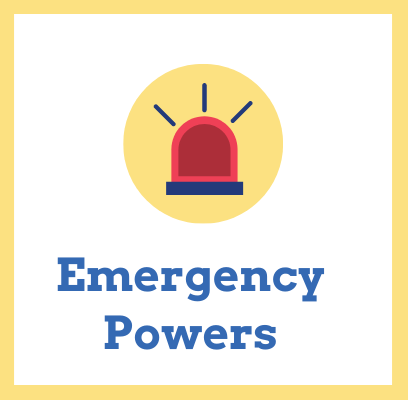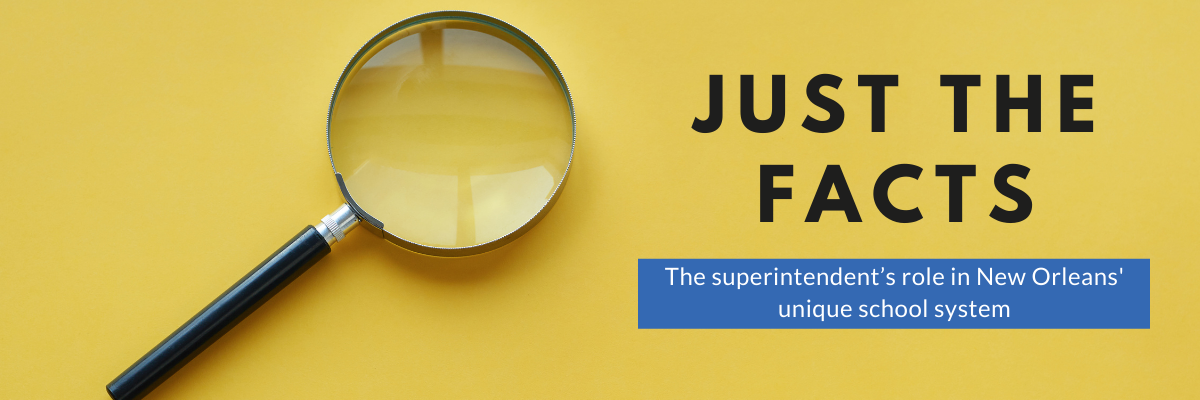As the Orleans Parish School Board (OPSB) begins its search for the next superintendent of NOLA Public Schools (NOLA-PS), NSNO’s new “Just The Facts” series will cover what the superintendent’s role entails in our unique system of schools.
Our system
The New Orleans public education landscape is different from any other nationwide. The 84 schools of NOLA Public Schools are each managed by independent, non-profit community boards following a contract, or “charter,” for how the school is run. New Orleans has both charter “networks” of multiple schools and “single-site” charters of just one school.
Charter boards hire executive leaders, or CEOs, who have autonomy over much of how their school runs, from who they hire, to what extracurricular activities they offer, to how they schedule their days. CEOs, in collaboration with network support teams, school leaders and staff, and the input of students and families, make the big decisions about how their schools are run, and teachers manage and plan what goes on in their classrooms.
This series is about the role our superintendent plays in all this. For the last seven years, Dr. Henderson Lewis, Jr. has led our district through immense challenge and change – most recently the COVID-19 pandemic and Hurricane Ida-related closures. As he prepares to leave his role in June, OPSB is seeking his replacement. They want our community to be involved in that decision, and we hope to help by providing information about what this important role entails. In upcoming blog posts, we will cover aspects of the job and what they mean for our children.

What is the role of our superintendent?
The superintendent leads NOLA-PS, New Orleans’ school district. They are hired by the Orleans Public School Board (OPSB), a publicly-elected, seven-member board that holds them accountable for their work.
The superintendent, in turn, holds NOLA-PS schools and networks to high academic, operational, and financial standards on behalf of our children (as set in LA RS 17:10.7.1, created by Act 91 by the Louisiana State Legislature). They manage citywide enrollment and school facilities. The superintendent also has important emergency powers. Today, we’ll examine what those are.

The Issue: Emergency Powers
Unlike in many school districts, the superintendent of NOLA-PS rarely makes sweeping decisions for all schools. In certain emergency situations, however, board policy and Louisiana state law gives the superintendent power to take swift action.
This includes an emergency caused by a natural or manmade disaster, or when the health, safety, or welfare of students is at risk. LA RS 17:10.7.1 gives the NOLA-PS Superintendent the power to require schools to “temporarily close, dismiss students, or evacuate in the event that there are credible threats of terror, or an official state of emergency is declared for the area in which any school under the board’s jurisdiction is located.”
Where we’ve seen this recently
Emergency powers most often come into play in New Orleans in case of weather disasters.
The Friday before Hurricane Ida hit, President Biden approved Governor John Bel Edwards’s request for an emergency declaration for Louisiana. This meant Superintendent Lewis could use his emergency powers to ensure schools were closed until it was safe for children to return. He did so, and after the storm passed, his team evaluated the state of school buildings on the ground. It was unclear at first when power would return to the city, and Lewis and his team knew that many students, educators, and families had evacuated the state.
He therefore set a window of September 15-22 for most schools to resume in-person instruction. Our schools used their autonomy to make choices about when during this window they would return. They were also in charge of communicating with their families and staff and determining how they would adjust their school days to make up for lost time going forward.
System-wide guidance without emergency powers
Some emergency situations don’t fall under the superintendent’s power, but the superintendent can still use their leadership to coordinate across our system, serve as a liaison with state officials, and communicate with families. Though our schools have autonomy in these situations, they recognize that a unified response to certain issues is both efficient for our system and offers clarity to students, families, and educators.
Our system might coordinate, for example, around inclement weather that is not declared an official emergency. Icy roads on a cold winter morning might cause the superintendent to recommend delaying the start of the school day citywide until the bus routes are safe. By evaluating the situation across New Orleans and making a clear call, the superintendent allows schools to focus on the many other concerns of such a moment, from communicating to families to figuring out a reworked schedule.
Superintendent Lewis and school leaders have coordinated in critical ways around the COVID-19 pandemic. Here, the superintendent’s leadership helped children, school teams, and families stay safe.
Since the COVID-19 crisis is not an official “state of emergency” for Louisiana, Superintendent Lewis’s role comes through his guidance and convening of schools, not his emergency powers. Last summer and the one prior, for instance, this coordination played a powerful role in ensuring our children could return safely to their buildings for the school year.
Over the summers of 2020 and 2021, Superintendent Lewis brought New Orleans’ charter management organization (CMO) and school leaders together for meetings around the path to reopening schools. Our CMO and school leaders knew that the chaos of this moment nationally required shared action across the district. They also knew that the complex nature of the virus required the utmost caution.
The superintendent served as a sort of “team captain.” In addition to convening leaders, he consistently checked in with state health officials for the latest data and best practices to share with schools. Together, the superintendent and schools picked a range of dates within which they would return to classrooms, and they also came up with a “Roadmap to Reopening” in which they laid out clear guidelines for how schools would manage safety. They released it a full two months before schools reopened, giving their teams and their students and families time to prepare and adjust.
As schools focused on putting all this in place, Superintendent Lewis then used his platform to share the protocol with families and community members in press conferences and public documents. NOLA-PS also led the process of gathering school-by-school data around COVID-19 cases to share publicly.
The superintendent can put resources behind this coordination. The district has provided internet hot-spots and coordinated with local hospitals to provide both COVID-19 testing and vaccines for students and teachers. They helped spread the word about where students could get their meals when school was virtual. They track COVID-19 cases across the district and report them across our community. This support saves schools and networks time, funds, and energy, allowing them to focus on the critical work inside their classrooms.
***
Our system of schools is set up to allow educators to use their creativity, ingenuity, and knowledge of their own students to build the best possible learning environment. The superintendent helps ensure that those environments are providing an excellent education and a safe, healthy community. A superintendent’s emergency powers give them important extra power to do so in times of crisis.
What does this mean for the next superintendent? As OPSB searches for the next superintendent and seeks input from our community, the ability to coordinate and make quick decisions will be important, as will the ability to stay calm and focused in case of emergency. Our next superintendent needs to be able to listen well to the input of charter leaders and take their thoughts into account. They need to build the strong relationships and trust required to move leaders to unite in a shared response. We have great faith in OPSB’s ability to pick this leader, with community input, over the course of this year.
